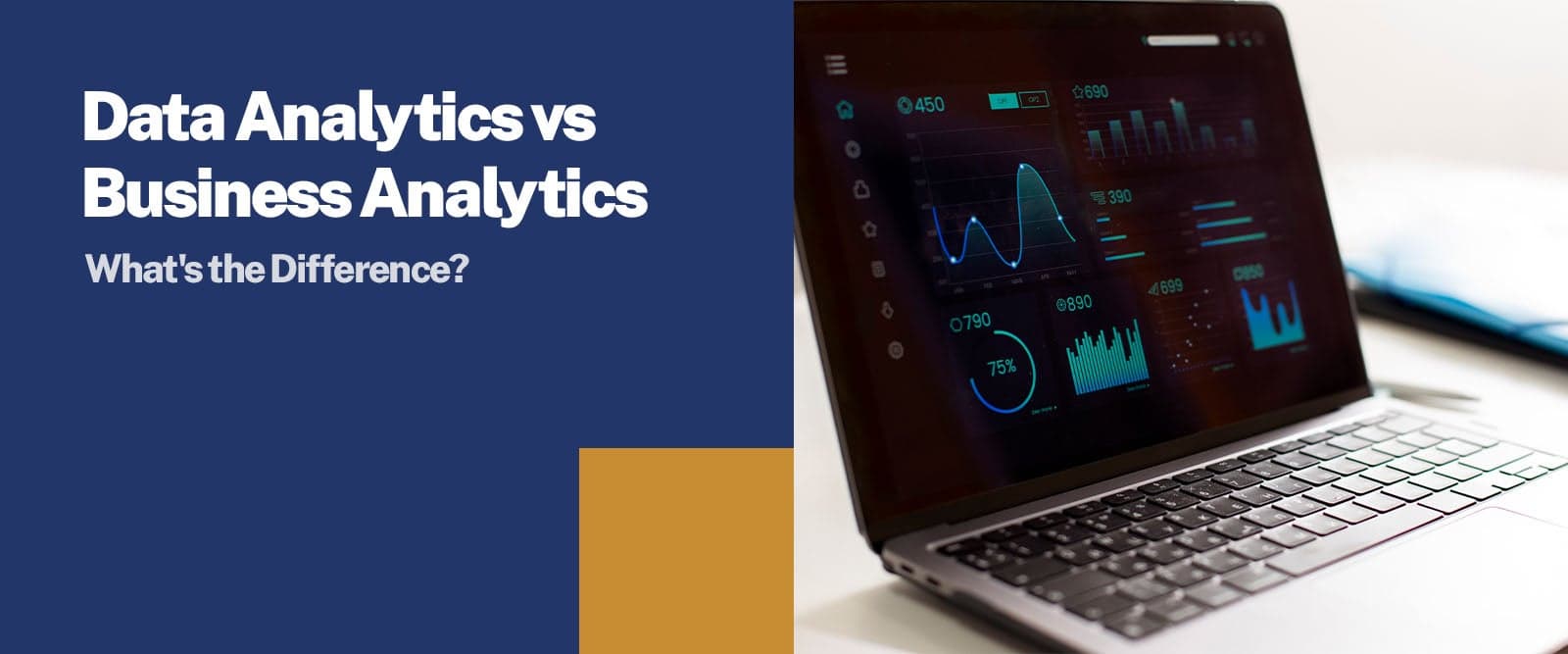5800 students unlocked their dream jobs with UG/PG programs in top colleges. Apply Now!
In the dynamic landscape of data-driven decision-making, the fields of Data Analytics and Business Analytics have emerged as powerful tools for organisations seeking to harness the full potential of their data. Aspiring data professionals often find themselves at a crossroads between these two fascinating domains.
In this blog, we will explore the disparities and unique applications of Data Analytics vs Business Analytics, and guide you on how to build a successful career in each with a BBA degree.
What is Data Analytics?
Data analytics is the process of examining, transforming, and interpreting large sets of data to uncover meaningful patterns, insights, and trends. It involves the use of various statistical, mathematical, and computational techniques to extract valuable information from raw data, ultimately supporting data-driven decision-making.
As a Data Analyst, you will be responsible for turning raw data into meaningful information that can be used to address business challenges, identify opportunities, and improve overall performance.
What is Business Analytics?
Business analytics is a subset of data analytics that specifically focuses on using data-driven techniques and tools to analyse business-related data and generate actionable insights for making strategic decisions and improving overall business performance. While data analytics deals with data in a broad sense, business analytics narrows its scope to cater to the specific needs and challenges faced by organisations.
As a Business Analyst, you will play an important role in understanding business needs, identifying problems, and proposing solutions to improve business processes, products, or services.
Business Analytics vs Data Analytics
Data Analytics and Business Analytics are related fields that involve the use of data to gain insights and support decision-making, but they have some key differences in their focus and approach. Here are the main factors that distinguish them:
|
Factors |
Data Analytics |
Business Analytics |
|
Focus |
The main goal is to extract meaningful information from raw data to gain insights and answer specific questions. |
Has a broader scope and concentrates on using data to solve business problems and optimise business processes |
|
Purpose |
Its purpose is to understand the data, draw conclusions from it, and reveal valuable insights. |
The primary purpose is to guide business decision-making and improve business performance. |
|
Business Context |
Generally employed to understand historical data and gain a better understanding of what has happened in the past. |
Focused on predicting future outcomes and helping organisations make informed decisions based on those predictions. |
|
Decision-Making Level |
Often used by analysts and researchers to explore data and find interesting patterns. |
Specifically targeted towards supporting business managers and executives in making strategic decisions. |
|
Techniques & Tools |
Commonly involves statistical techniques, data mining, exploratory data analysis, and visualisation tools to understand the data's structure and relationships. |
Incorporates various advanced analytics methods like predictive modelling, machine learning, optimisation algorithms, and simulation to make data-driven business decisions. |
Career in Data Analytics
To build a successful career in Data Analytics you can follow the given below steps:
- Completion of high school with 50% is a minimum requirement to apply for a bachelor's degree in a related field like Computer Science, Statistics, Mathematics, Economics, or Engineering can give you a solid foundation in data analytics. However, most of the students prefer to pursue BBA in Data Analytics for a better and core understanding of the field.
- Proficiency in programming languages is essential for data analytics. Start by learning languages like Python or R, which are widely used in the industry.
- Practice your skills by working on personal projects. Choose datasets of interest to you and analyse them to gain hands-on experience. This will help you build a portfolio to showcase to potential employers.
- Apply for internships at companies or organisations that use data analytics. Internships provide valuable industry experience and can lead to full-time job offers.
- You can also apply for MBA in Data Analytics to add more credibility to your profile and increase your job prospects.
- Start applying for entry-level data analytics positions in companies, startups, consulting firms, or IT services providers. Look for roles like Data Analyst, Business Analyst, or Junior Data Scientist.
Career in Business Analytics
To build a successful career in Business Analytics you can follow the given below steps:
- Students are first required to complete their high school with a minimum of 50% in any field. Then apply for a bachelor’s degree in disciplines such as BBA in Business Analytics.
- Acquire skills in data analysis, statistics, programming (Python, R, SQL), data visualisation, and machine learning.
- Apply for internships or entry-level positions in companies that deal with data analysis. This will provide you with hands-on experience and exposure to real-world business analytics scenarios.
- Create a portfolio showcasing the projects that you have completed during your coursework, internships, or personal projects to demonstrate your skills to potential employers.
- You can also consider pursuing an MBA in Business Analytics to further enhance your knowledge and expertise. This can open up more advanced and higher-paying career opportunities.
Which is Better: Data Analytics or Business Analytics?
The better career choice depends on your interests, strengths, and the type of work environment you prefer. Some individuals might find joy in exploring and making sense of data as Data Analysts, while others may thrive in understanding business needs and helping organisations achieve their goals as Business Analysts.
It's worth noting that both roles often overlap in their responsibilities, and some organisations might use the terms interchangeably. Additionally, career paths are not set in stone, and you may find opportunities to transition between roles or specialise further as your career progresses.
If possible, try to gain exposure to both roles through internships, personal projects, or networking to get a better sense of which aligns better with your career aspirations.
Conclusion
A BBA degree acts as a solid foundation with essential business knowledge and management skills that serve as a powerful addition to the analytical skills required in both Data Analytics and Business Analytics. Graduates with a BBA degree possess a unique advantage, understanding not only the difficulties of data analysis but also the broader context of how data-driven decisions influence business operations and strategic planning.
You can apply for the BBA program at Sunstone if you plan to pursue a BBA undergraduate degree. You receive a lot of advantages that will help you develop your career. 70+ training and development sessions by top recruiters and industry experts, learn from expert guest faculty who are ex-IIMs and IITs, build a professional portfolio and many more benefits you get if you apply with Sunstone.
FAQs - Data Analytics vs Business Analytics
What is the average salary of a business analyst after a BBA degree?
On average BBA Business Analytics salary is ₹6.5 LPA.
What are the main subjects included in the BBA business analytics syllabus?
The specific subjects included in the BBA Business Analytics syllabus can vary from one university or institution to another. However, the core curriculum typically covers a combination of business-related courses and analytics-focused subjects.
Who has the higher salary business analyst or data analyst?
A business analyst typically earns more than a data analyst in India.
Is it difficult to find a job after BBA?
Finding a job after BBA may be challenging but the degree equips you with a strong foundation in business principles and can open doors to various career paths.
Can I get a decent job if I pursue a full-time course from colleges powered by Sunstone?
Yes, if you choose colleges powered by Sunstone, you will have access to 50+ assured job interviews with MNCs
Which are the top 5 colleges powered by Sunstone for the BBA program?
You can pursue BBA courses from colleges powered by Sunstone. Some of the top colleges are:
- Atlas Ideal International College
- Ajeenkya DY Patil University
- GD Goenka University
- Bangalore Institute of Management Studies
- SAGE University
HELP
Take the first step towards your dream job.
ABOUT THE AUTHOR

